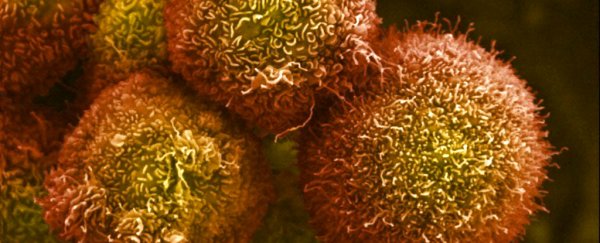Microsoft has announced an ambitious plan to use computer science to 'solve' cancer within the next decade.
While that plan involves many ambitious projects, one of the most interesting of proposals involves creating ultra-small DNA computers that can live inside a person's body, monitoring for cancer cells and reprogramming them into healthy cells as soon as they pop up.
"I think it's a very natural thing for Microsoft to be looking at because we have tremendous expertise in computer science and what is going on in cancer is a computational problem," Chris Bishop from Microsoft Research told Sarah Knapton at The Telegraph.
"It's not just an analogy, it's a deep mathematical insight. Biology and computing are disciplines which seem like chalk and cheese but which have very deep connections on the most fundamental level."
To make their goal a reality, Microsoft, which isn't known for stepping so far outside of the consumer electronics sphere, has gathered a team of biologists and computer scientists from around the world to work on various aspects of cancer research.
The details are still thin on the ground, but one team plans on using machine learning and computer vision – where computers glean information from images or videos – to give radiologists a better understanding of how a specific patient's tumour is progressing.
This could open up a more nuanced type of personalised medicine.
Another team is working on algorithms to predict the best plan of attack for each specific tumour type.
Then there's the group working on that 'moonshot' idea to make computers out of DNA that will monitor and reprogram cancer cells inside the body.
The thinking is that, every time cancerous cells arise in the body, the computer would know, and "reboot the system and clear out the diseased cells", explains Knapton.
Despite these varied approaches, Microsoft says that all of the projects – no matter how different – follow two similar computer science approaches: information processing and machine learning.
"One approach is rooted in the idea that cancer and other biological processes are information processing systems," the company said.
"Using that approach the tools that are used to model and reason about computational processes – such as programming languages, compilers and model checkers – are used to model and reason about biological processes."
The team says that machine learning will allow researchers to better analyse millions and millions of files of biological data in search of new treatment approaches, a process that – until recently – has been done by hand.
Machine learning could have the power to finally speed this up faster than ever thought possible.
"We're in a revolution with respect to cancer treatment. Even 10 years ago people thought that you treat the tissue: you have brain cancer, you get brain cancer treatment. You have lung cancer, you get lung cancer treatment," said David Heckerman, director of Microsoft's genomics team, in a press statement.
"Now, we know it's just as, if not more, important to treat the genomics of the cancer, e.g. which genes have gone bad in the genome."
As for their ambitious timeline, saying that they will have cancer 'solved' in less than a decade, many of the researchers working on the project are confident that this can be achieved.
"If we are able to control and regulate cancer then it becomes like any chronic disease and then the problem is solved," senior researcher Jasmin Fisher told The Telegraph.
"I think for some of the cancers five years, but definitely within a decade. Then we will probably have a century free of cancer."
Only time will tell if they are right or not, but we have our fingers crossed that something good will come of their new mission.
